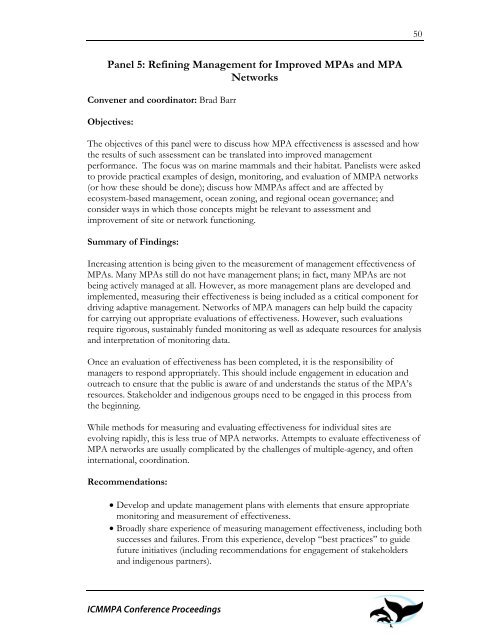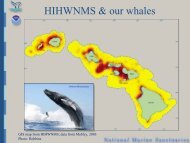The First International Conference on Marine Mammal Protected Areas
The First International Conference on Marine Mammal Protected Areas
The First International Conference on Marine Mammal Protected Areas
You also want an ePaper? Increase the reach of your titles
YUMPU automatically turns print PDFs into web optimized ePapers that Google loves.
Panel 5: Refining Management for Improved MPAs and MPA<br />
Networks<br />
C<strong>on</strong>vener and coordinator: Brad Barr<br />
Objectives:<br />
<str<strong>on</strong>g>The</str<strong>on</strong>g> objectives of this panel were to discuss how MPA effectiveness is assessed and how<br />
the results of such assessment can be translated into improved management<br />
performance. <str<strong>on</strong>g>The</str<strong>on</strong>g> focus was <strong>on</strong> marine mammals and their habitat. Panelists were asked<br />
to provide practical examples of design, m<strong>on</strong>itoring, and evaluati<strong>on</strong> of MMPA networks<br />
(or how these should be d<strong>on</strong>e); discuss how MMPAs affect and are affected by<br />
ecosystem-based management, ocean z<strong>on</strong>ing, and regi<strong>on</strong>al ocean governance; and<br />
c<strong>on</strong>sider ways in which those c<strong>on</strong>cepts might be relevant to assessment and<br />
improvement of site or network functi<strong>on</strong>ing.<br />
Summary of Findings:<br />
Increasing attenti<strong>on</strong> is being given to the measurement of management effectiveness of<br />
MPAs. Many MPAs still do not have management plans; in fact, many MPAs are not<br />
being actively managed at all. However, as more management plans are developed and<br />
implemented, measuring their effectiveness is being included as a critical comp<strong>on</strong>ent for<br />
driving adaptive management. Networks of MPA managers can help build the capacity<br />
for carrying out appropriate evaluati<strong>on</strong>s of effectiveness. However, such evaluati<strong>on</strong>s<br />
require rigorous, sustainably funded m<strong>on</strong>itoring as well as adequate resources for analysis<br />
and interpretati<strong>on</strong> of m<strong>on</strong>itoring data.<br />
Once an evaluati<strong>on</strong> of effectiveness has been completed, it is the resp<strong>on</strong>sibility of<br />
managers to resp<strong>on</strong>d appropriately. This should include engagement in educati<strong>on</strong> and<br />
outreach to ensure that the public is aware of and understands the status of the MPA’s<br />
resources. Stakeholder and indigenous groups need to be engaged in this process from<br />
the beginning.<br />
While methods for measuring and evaluating effectiveness for individual sites are<br />
evolving rapidly, this is less true of MPA networks. Attempts to evaluate effectiveness of<br />
MPA networks are usually complicated by the challenges of multiple-agency, and often<br />
internati<strong>on</strong>al, coordinati<strong>on</strong>.<br />
Recommendati<strong>on</strong>s:<br />
• Develop and update management plans with elements that ensure appropriate<br />
m<strong>on</strong>itoring and measurement of effectiveness.<br />
• Broadly share experience of measuring management effectiveness, including both<br />
successes and failures. From this experience, develop “best practices” to guide<br />
future initiatives (including recommendati<strong>on</strong>s for engagement of stakeholders<br />
and indigenous partners).<br />
ICMMPA <str<strong>on</strong>g>C<strong>on</strong>ference</str<strong>on</strong>g> Proceedings<br />
50



